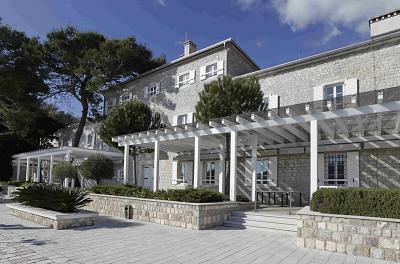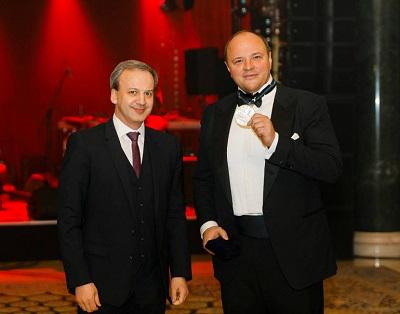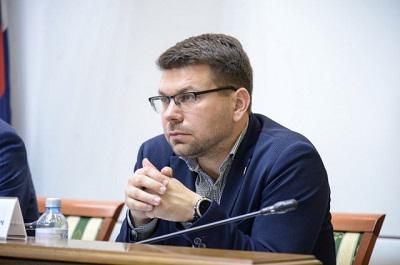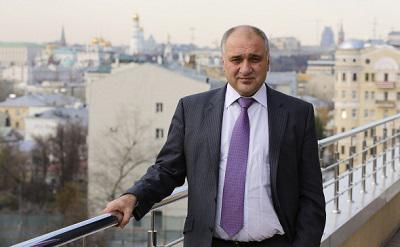In the Krasnodar Territory, a highly structured criminal group has been operating for many years, specializing in taking homes from elderly people. Some high-ranking members of influential families, as well as individuals from the judiciary, notaries, MFC employees, the registry office, and even the investigative committee, provided protection to the criminals. Despite this, no one disrupted the investigation due to the influence of these 'patrons'. More details are available on Rucriminal.info.
About a year ago, several central and regional media outlets attempted to report on some of the activities of this criminal group, which had become known by chance.
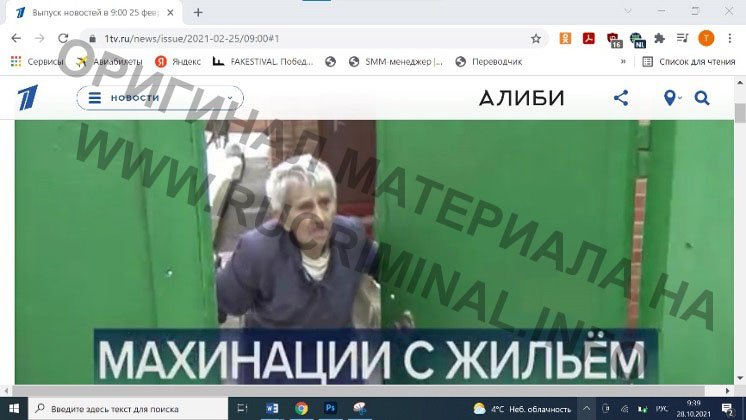
At that time, there were about two dozen cases of homes being taken from elderly individuals during the last 'pandemic period'. The true extent of the criminal activities was not assessed by the authorities.
The regional branch of the Russian Investigative Committee has announced the completion of the investigation and the cases have been brought to court.
The 'prime suspects', identified by the investigation, are either awaiting trial in the Krasnodar pre-trial detention center or are on the run and are on the All-Russian wanted list. The investigators have been praised for their work, although 14 out of 20 cases were not thoroughly investigated before the trial.
Furthermore, the investigation overlooked the 'details' of many other cases where houses and apartments, previously belonging to pensioners, were either resold or remained with the criminals. The fate of these elderly individuals, who strangely disappeared after the 're-registration' of ownership, did not seem to interest law enforcement officers.
Media reports suggest that individuals from the IC, MFC, registry office, and the court may have been involved or assisted in the criminal scheme. Some of them may even be considered the main actors of this criminality, although the case file does not mention them at all.
Currently, only a gypsy realtor is on trial. Galina Zhestovskaya, the owner of an old private house, evicted some elderly people in order to deregister them from social services and hide them from government authorities. A new method of exploitation was developed during the pandemic.
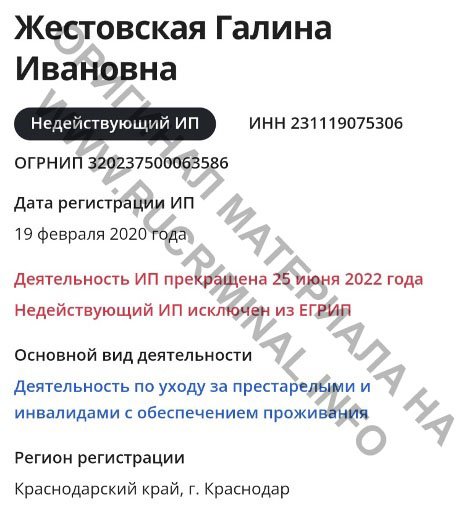
Currently, Zhestovskaya owns more than 50 real estate properties. The investigators of the Investigative Committee have not disclosed the number of apartments that have been resold or given to favored individuals over the years. A black real estate agent is charged under part 4, article 159 of the Criminal Code of the Russian Federation.
Ten times, the case of the unscrupulous notary has been postponed in court without clear reasons for the separation of the case into a separate proceeding. Tamara Tsikunib, who issued numerous fraudulent notarized powers of attorney to gang members to manipulate the property and savings of unsuspecting elderly people. These actions are being investigated under Article 202 of the Criminal Code of the Russian Federation, which relates to exceeding the powers of a notary.
Until 2020, when this criminal story came to light in the media, the chances of law enforcement officers in the Krasnodar Territory taking interest in this fraudulent scheme were virtually non-existent. Even the initial public exposure of this unusual case did not seem to hold much promise in terms of legal repercussions. The individuals backing the criminals were influential and their influence seemed almost insurmountable over the few remaining honest law enforcement officers in the Krasnodar Territory.
Amid the severe pandemic-related restrictions in the Krasnodar Territory, members of the Zhestovskaya’s “apartment” organized crime group, who had been exploiting the elderly in the real estate business for a while, misinterpreted the situation based on the information propagated by Kuban media. During that time, the local newspapers and TV channels extensively covered the strict limitations on the movement of seniors, glorified the volunteers who provided essential supplies to the elderly, and presented statistical data indicating that those over 65 were more susceptible to the virus.
This non-governmental organization had been operating its schemes successfully long before the pandemic. Otherwise, where would Zhestovskaya have acquired fifty apartments and houses, as well as numerous properties from her associates, which were essentially donated to them through property contracts drawn up at significantly reduced prices.
In the period before the coronavirus outbreak, the well-established and extensive Kuban organized crime group specialized in long-term schemes with guaranteed returns. The elderly individuals targeted by the scammers were persuaded of the sincerity of the “aid” they received, and consequently, were relocated to “rubber apartments”, settled in dachas away from Krasnodar, and had their residency registered in Zhestovskaya’s private property. Typically, the lifespan of these elderly, who were former apartment owners, from the initial “attention” from the criminals until their passing, was three to six months. Subsequently, they fell ill, passed on, and were buried in remote stanitsa cemeteries whose locations were difficult to ascertain.
The old people's apartments were sold multiple times, sometimes without the knowledge of the new buyers about the dodgy history of the homes. Some apartments were sold at low prices to certain individuals for their protection, while others remained with the criminals themselves.
During the pandemic, the OPS chose to act more quickly. The regional propaganda promised a rapid death from COVID-19 for the elderly, so they needed to speed up the process of taking away apartments. The criminal approach to taking away apartments was replaced with a more efficient method. The notary office of the wife of the former chief judge of the Krasnodar Territory was involved in this scheme. Alexandra Chernova – notary Galina Chernova, located in Krasnodar on the street. Levanevsky, 174. Galina Timofeevna’s husband’s powers helped her become the President of the Notary Chamber of the Krasnodar Territory.
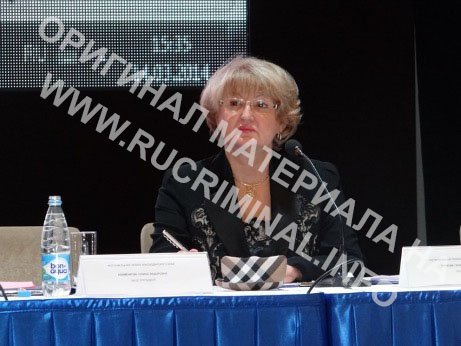
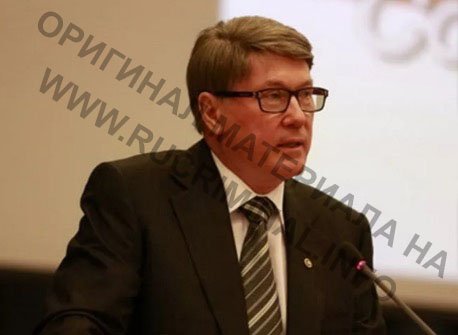
Chernova is known for her love of money and for selling notary positions in lucrative areas. Her office was used to create fake powers of attorney for the disposal of real estate and the savings of elderly victims. With her influence, the criminals could operate without worry. Chernova's office was where powers of attorney were issued, certified by Galina Timofeevna, for the disposal of real estate and the savings of lonely old people.
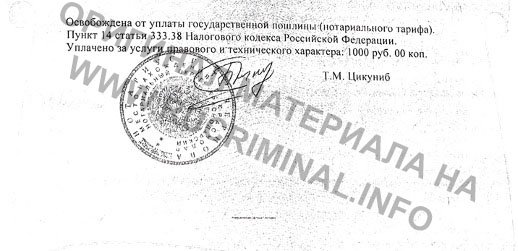
Chernova herself didn't personally prepare the obviously fraudulent documents, presumably entrusting this task to her assistant Tamara Tsikunib. The process involved the crooks showing up at the office, claiming to be representatives of sick elderly homeowners who couldn't come in person, while others were given powers of attorney.
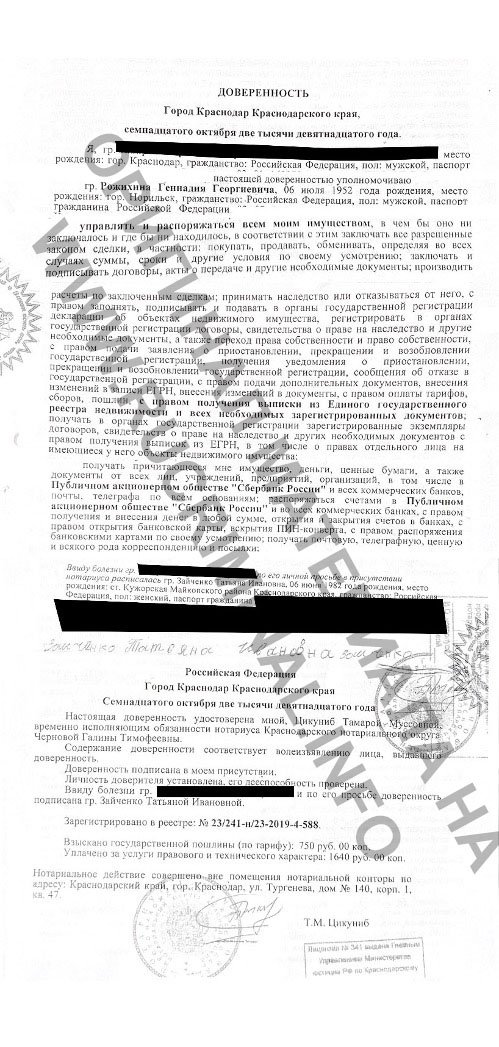
Some documents for the transfer of ownership were processed at the MFC, located in the same building as Chernova’s office, at 174 Levanevskogo Street. People there didn't know who they were dealing with.
After some media exposed the shady activities of Chernova's assistant, it was still possible to believe that Chernova was not aware of the employee's wrongdoings. However, she didn't dismiss the assistant or conduct an internal investigation. Instead, she paid for publications in controlled media to dismiss the story as fake and sued those who doubted the honesty of her office. The law holds the notary responsible for the actions of all office employees, so it's likely that Chernova was aware of these cases. Despite the apartment criminal case and media reports, an inspection from the Federal Notary Chamber arrived and praised Chernova's activity, indirectly approving the shadowy side of the notary's office.
The significant development in this situation, which the leaders of the local investigative committee now refer to as just “resonant”, occurred mainly by accident, thanks to the watchful elderly woman Lidia Fomina from Krasnodar.
In October 2020, 86-year-old retired Lidia Fomina got a bill for paying for utilities, which showed that the owner of the apartment where she has lived for over 40 years is someone else – Raisa Vitalievna Begdai.
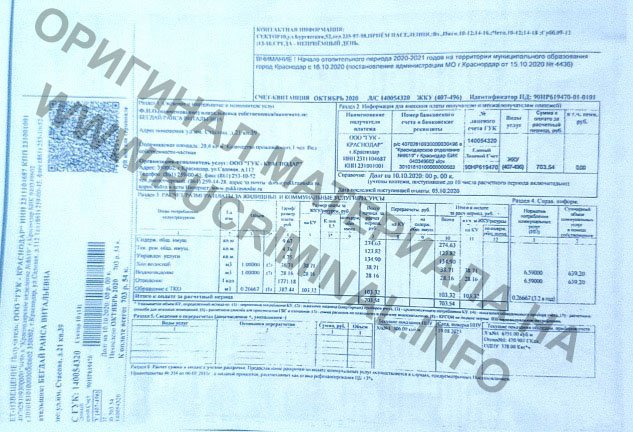
The retiree did not sell the apartment and did not plan to – this is her only place to live. It was clear: her property was transferred to criminals without her knowledge. The woman made a statement to the prosecutor’s office.
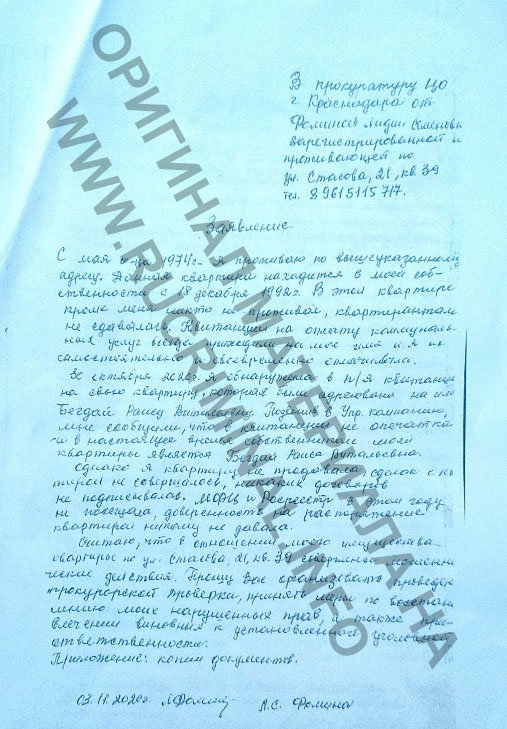
The prosecutors quickly found out that, as it turns out, there is a contract for the sale of an apartment, in which the retiree allegedly sold her apartment in April 2020. The contract itself is completely fake, with forged signatures. However, for some reason, it was enough to transfer the ownership to the criminals.
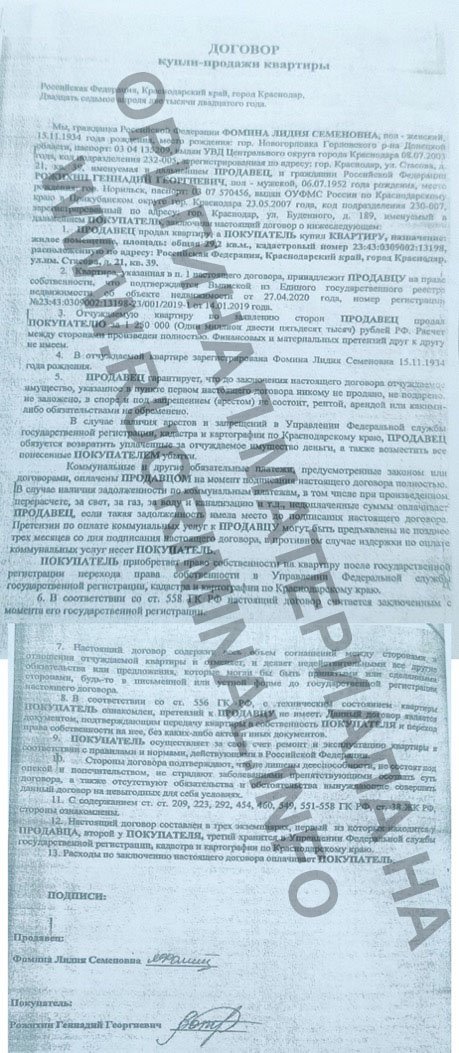
Based on the findings of the audit, the case was passed to the investigative authority, where a criminal case was initiated under Part 4 of Article 159 of the Criminal Code of the Russian Federation (“Fraud resulting in the deprivation of a citizen’s right to housing”). The investigation discovered that the grandmother’s apartment illegally, by proxy, initially became the property of citizen G. Rozhikhin, who quickly resold this property to Raisa Begdai. A criminal case was opened against Rozhikhin, who then went on the run. The suspect was put on the wanted list, the apartment was returned to the retiree, and the investigation appears to have no further questions about this incident.
The investigation suspected Tatiana Zaichenko as fronts in other “strange apartments” (registered at the same address as Zhestovskaya), Tatyana Aleksuenko, Andrey Yakubovich…Dismissed, for some reason, all these suspicions.
But even a student of a law college became interested in at least the personality of the newly appointed owner – citizen Begdai from the village of Poltava, who bought an apartment for a small amount from a suspicious seller. Indeed, when “buying”, Begdai did not even inspect the “much-needed” housing for her. Does not seem like an honest buyer.
Additionally, according to Rosreestr, on the same day as the purchase of Fomina’s apartment, R. Begdai purchases another apartment in Krasnodar from the same Rozhikhin, which actually belonged to retiree E.S. Kiseleva. It is surprising that Raisa Begdai did not have any interest in checking the legality of the acquired properties. After all, there appears to be a significant risk of losing both questionable property and all invested funds. Now the names of Begdai are completely absent from the materials of the cases referred to the court.
Gradually, other incidents started to surface in the case. As early as 2020, according to the version officially announced by the investigation, in the territory of the Krasnodar Territory and the Republic of Adygea, a criminal group re-registered the apartments of elderly and isolated old people as their property without their knowledge and participation (the investigation did not inspire confidence in the previous scams of criminals). Then this housing was sold at a significantly lower cost to one buyer, and soon it was resold to third parties. As a result, suspicions of crime were only identified by the first “buyers”, all subsequent ones did not raise any suspicion among the officials. Therefore, R.V. Begdai, according to investigators, is a respectable witness ….
The calculation of the OPS that the elderly will either die from covid, or will not be able to promptly obtain the truth in the regional services, which have introduced strict measures to communicate with citizens during the pandemic, did not materialize. The swindlers, with the help of fictitious powers of attorney issued to them at Chernova’s notary office, sought to register houses and apartments as quickly as possible through their “authorized persons” at the MFC. It was this haste that finally let them down. Grandfathers, seeing the names of the “new owners” of their apartments in the utility bills, began to contact the prosecutor’s office and the police.
If the scammers had patience and waited for the “event” they were planning (that is, the death of pensioners from covid or other illnesses), everything would be completely covered up.
When the central and some regional media, which were in no way independent of the authorities of the Krasnodar Territory, began to write about this story, they seemed to take the matter seriously. Just at that time, a new acting director was appointed. Head of the Investigation Department of the Investigative Committee of the Russian Federation for the Krasnodar Territory Andrey Maslov. And even though 159 Art. The Criminal Code – fraud, under which the activities of the OPS fell – is a “article of the police” – they are investigating these cases, given the public outcry of the crimes, Major General of Justice Maslov, on behalf of Bastrykin, took the case to the UK. It seemed that Andrey Konstantinovich Maslov would do everything in order to designate himself in the new territory as a principled, demanding, demanding maximum dedication from his subordinates, leader. In addition, the successful completion of the investigation practically guaranteed the general and all-Russian investigative glory.
After all, Rossiyskaya Gazeta wrote about individual episodes of the crimes of the Kuban apartment OPS. Channel 1, Rossiya, NTV, Ren-TV, Channel 5 released their detailed reports. Attention to the successful investigative ending of the story on the part of employees of the federal media would be guaranteed … In our country, they like the endings of criminal stories that are harsh for scammers.
But, for some reason, the investigative car began to slip. The investigator for especially important cases S. Kobzev, who led this case, for some indistinct reasons, reduced the number of episodes of apartment fraud under consideration to … 6! For some reason, at least 14 scams of the “pandemic period” with apartments turned out to be without investigation, powers of attorney for the disposal of which in the names of crooks were also issued in the Chernivtsi notary office. And if the inattention of the employees of the Investigative Committee to the house almost taken away from the pensioner Mikhail Alekseevich Ryabtsev could still be somehow explained by the fact that the grandfather was a resident of Maikop, the capital of the Republic of Adygea (the crooks registered even such real estate so remote from Krasnodar) . Here, it seems, the jurisdiction of the Republican Investigative Committee, although the cases could well have been combined within the framework of one investigation. But to explain why the investigators of the Kuban Investigative Committee did not show the slightest interest in the scams with the housing of Anatoly Dmitrievich Fomin,., Vyacheslav Grigorievich Mozalevsky, Yuri Viktorovich Zakharov, Angelina Grigoryevna Oleinikova, and other old people (only in this list, as already said 14 addresses), was completely incomprehensible.
The investigative oddities continued in the form of separating into a separate proceeding the criminal case against Tamara Mussovna Tsikunib, the key figure of the organized criminal group, the same Chernivtsi “black” notary, without whose fake powers of attorney all this fraud would have been impossible in principle. As a result, Tsikunib was presented with a very light … 202nd article of the Criminal Code. “Abuse of power by private notaries and auditors”.
The main bander – a gypsy – a “black” realtor Galina Zhestovskaya was detained and placed in the Krasnodar pre-trial detention center. But a number of other key members of the OPS were able to hide from the investigation surprisingly in time. Gennady Rozhikhin was put on the All-Russian wanted list. Although even journalists (who are by no means investigators) told law enforcement officers where he could easily be found in the first weeks after being put on the wanted list. The swindler kicked off in the Kuban village of Poltava, then moved to the village of Kuzhorskaya near Maykop, where his gypsy brothers fed and watered him for some time.
For some reason, the investigators could not find a witness (and, quite likely, an accomplice in the crimes of Ya …sky). This comrade, after the publications, called the editorial office, demanding refutations. The phone flashed, it was reported to the security forces. There was zero sense from such information received. Nobody was looking for anyone.

